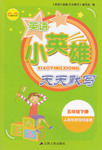题目内容
【题目】In order to know a foreign language thoroughly, four things are neccessary. Firstly, we must understand the language when we hear 【1】spoken.. Secondly, we must be able to speak it correctly with confidence and without hesitation. 【2】 ,we must be able to read the language , and fourthly, we must be able to write it. We must be able to make sentences that are grammatically correct.
There is no easy way to success 【3】 language learning. 【4】 good memory is of great help, but it is not enough only 【5】(memorize) rules from a grammar book. It is not much use learning by heart long list of words and 【6】meaning, studying the dictionary and so on. We must learn by using the language. 【7】we are satisfied with only a few rules we have memorized, we are not really learning the language “Learn through use” is a good piece of 【8】(advise) for those 【9】are studying a new language. Practice is important. We must practise speaking and 【10】(write) the language whenever we can.
【答案】
【1】it
【2】Thirdly
【3】in
【4】A
【5】to memorize
【6】their
【7】If
【8】advice
【9】who
【10】writing
【解析】本文讲述了如何学好一门外语。
【1】考查代词用法。根据前文的the language 为单数,故此处应填入指物的代词it来指代前文的the language,故填入it。
【2】考查插入语用法。文章的第一句表明学习语言有四个方面是必要的的条件,第一段已经明示了firstly, secondly,fourthly,故还差第三点,所以应填入Thirdly,首字母需要大写。
【3】考查success的用法。success in sth or in doing sth 在某事上成功或成功做某事。故这里要填入in。
【4】考查冠词用法。此处memory为单数,所以要用不定冠词a来修饰,且位于句首需要大写,句子译为“一个好的记忆具有极大帮助”。
【5】考查enough固定搭配。be not enough to do sth 做某事是不够的。给出的单词提示是memorize,故应填入to memorize。
【6】考查物主代词用法。根据前文出现的list of words,可以判断and后面应该使用their来指代“许多单词”,故填入their。
【7】考查if引导的条件状语从句。句意:如果我们很满意自己仅仅只是记住了一少部分关于语言的规则,那么我们就不能够算是真正的学习了语言。因位于句首,首字母应大写,故填入If。
【8】考查advise的名词形式。介词后面要用名词,a good piece of advice 表示“一个好的建议”。
【9】考查定语从句用法。此处those指代下文那些学习语言的人,所以应用who来引导该定语从句,填入who。
【10】考查practise的用法。practise doing sth 练习做某事。故此处应填入write的V-ing 形式,即填入writing。

 英语小英雄天天默写系列答案
英语小英雄天天默写系列答案 暑假作业安徽少年儿童出版社系列答案
暑假作业安徽少年儿童出版社系列答案